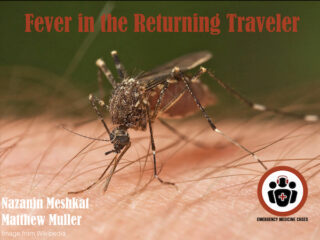Special Populations
Best Case Ever 61 Biohazard Preparedness: The Protected Code Blue
In anticipation of EM Cases Main Episode 100 on Disaster Medicine with Laurie Mazurik, David Kollek and Joshua Bezanson, Dr. Mazurik tells of her experience as a disaster medicine leader with keeping health care workers safe during the SARS era. If you were faced with a patient with suspected Ebola or drug resistant TB or any other biohazard patient who required intubation, would you know how to handle the situation so that you and your colleagues were safe...
Episode 87 – Alcohol Withdrawal and Delirium Tremens: Diagnosis and Management
Alcohol withdrawal is everywhere. We see over half a million patients in U.S. EDs for alcohol withdrawal every year. Despite these huge volumes of patients and the diagnosis of alcohol withdrawal seeming relatively straightforward, it’s actually missed more often than we’d like to admit, being confused with things like drug intoxication or sepsis. Or it’s not even on our radar when an older patient presents with delirium. What’s even more surprising is that even if we do nail the diagnosis, observational studies show that in general, alcohol withdrawal is poorly treated. So, to help you become masters of alcohol withdrawal management, our guest experts on this podcast are Dr. Bjug Borgundvaag, an ED doc and researcher with a special interest in emergency alcohol related illness and the director of Schwartz-Reismann Emergency Medicine Institute, Dr. Mel Kahan, an addictions specialist for more than 20 years who’s written hundreds of papers and books on alcohol related illness, and the medical director of the substance use service at Women’s College Hospital in Toronto, and Dr. Sara Gray, ED-intensivist at St. Michael's Hospital...
Best Case Ever 50 – Delirium Tremens
In anticipation of EM Cases Episode 87 on Alcohol Withdrawal Dr. Sara Gray describes her Best Case Ever of severe alcohol withdrawal and Delirium Tremens from Janus General. Also on this podcast Dr. Anand Swaminathan reacts to Episode 86 Emergency Management of Hyperkalemia and discusses the use of calcium in the setting of digoxin toxicity. Early recognition and treatment of Delirium Tremens - a rapid onset of severe alcohol withdrawal accompanied by delirium and autonomic instability about 3-10 days after the appearance of withdrawal symptoms - is key to preventing long term morbidity and mortality...
Episode 85 – Medical Clearance of the Psychiatric Patient
Psychiatric chief complaints comprise about 6 or 7% of all ED visits, with the numbers of psychiatric patients we see increasing every year. The ED serves as both the lifeline and the gateway to psychiatric care for millions of patients suffering from acute behavioural or psychiatric emergencies. As ED docs, besides assessing the risk of suicide and homicide, one of the most important jobs we have is to determine whether the patient’s psychiatric or behavioral emergency is the result of an organic disease process, as opposed to a psychological one. There is no standard process for this. With the main objective in mind of picking up and appropriately managing organic disease while improving flow, decreasing cost and maintaining good relationships with our psychiatry colleagues, we have Dr. Howard Ovens, Dr. Brian Steinhart and Dr. Ian Dawe discuss this controversial topic...
Episode 77 Fever in the Returning Traveler
In this EM Cases episode with Dr. Nazanin Meshkat, multinational ED doc and Dr. Matthew Muller, infectious disease specialist, we discuss the most common tropical disease killers that we see in patients who present with Fever in the Returning Traveler. Every year an increasing number of people travel abroad, and travelers to tropical destinations are often immunologically naïve to the regions they’re going to. It’s very common for travelers to get sick. In fact, about 2/3 of travelers get sick while they’re traveling or soon after their return, and somewhere between 3 and 19% of travelers to developing countries will develop a fever. Imported diseases, like Malaria, Dengue, Ebola, and Zyka can be acquired abroad and brought back to your ED in unsuspecting individuals. This is serious stuff - you might be surprised to learn that Malaria is responsible for more morbidity and mortality worldwide than any other illness. According to a study in CJEM most emergency physicians have minimal or no specific training in tropical diseases and emergency physicians indicated an unacceptably low level of comfort when faced with patients with tropical disease symptoms. In fact, 40% of the cases were incorrectly diagnosed or managed. And Canadian ED docs aren’t the only ones who’s skill isn’t stellar in this department - a similar 2006 study of UK physicians showed a 78% misdiagnosis rate. This misdiagnosis rate isn’t wholly because of lack of knowledge – it almost certainly also has to do with the vague presentations and huge amount of overlap between so many tropical disease. You might be thinking that it’s impossible to learn all the thousands of details of the dozens of different tropical diseases - true. However, in the ED, while we don’t need to know every detail of every tropical disease, and don’t necessarily need to make the exact diagnosis right away, we do need to have a rational, organized approach to diagnosing and managing fever in the returning traveler, so that we can identify some of the more common serious illnesses like Malaria, Dengue and Typhoid fever, and start timely treatment in the ED.
Episode 74 Opioid Misuse in Emergency Medicine
Pain leads to suffering. Opioid misuse leads to suffering. We [...]







